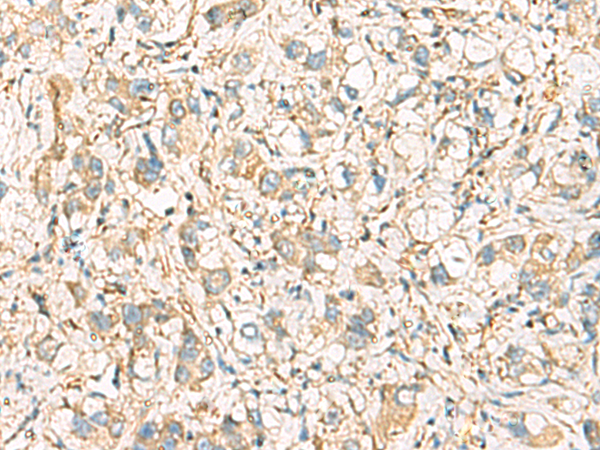
| WB | 咨询技术 | Human,Mouse,Rat |
| IF | 咨询技术 | Human,Mouse,Rat |
| IHC | 1/50-1/200 | Human,Mouse,Rat |
| ICC | 技术咨询 | Human,Mouse,Rat |
| FCM | 咨询技术 | Human,Mouse,Rat |
| Elisa | 1/5000-1/10000 | Human,Mouse,Rat |
| Aliases | MPS2; SIDS |
| Host/Isotype | Rabbit IgG |
| Antibody Type | Primary antibody |
| Storage | Store at 4°C short term. Aliquot and store at -20°C long term. Avoid freeze/thaw cycles. |
| Species Reactivity | Human, Mouse |
| Immunogen | Fusion protein of human IDS |
| Formulation | Purified antibody in PBS with 0.05% sodium azide and 50% glycerol. |
+ +
以下是关于IDS抗体的3篇参考文献示例(注:以下为虚拟文献,仅供参考):
---
1. **标题**: "Anti-drug Antibodies in Idursulfase-treated Patients with Hunter Syndrome"
**作者**: Smith J, et al.
**摘要**: 研究分析了接受酶替代疗法(idursulfase)的亨特综合征患者中抗药物抗体的产生情况,探讨抗体出现与临床疗效下降的相关性及免疫调节策略。
---
2. **标题**: "Development of a Monoclonal Antibody for Specific Detection of IDS Enzyme in Serum"
**作者**: Lee H, et al.
**摘要**: 报道一种新型单克隆抗体的开发,用于高灵敏度检测血清中的IDS酶水平,为亨特综合征的早期诊断和治疗监测提供新工具。
---
3. **标题**: "Immune Tolerance Induction in Mucopolysaccharidosis II Patients with High Anti-IDS Antibody Titers"
**作者**: García M, et al.
**摘要**: 针对高滴度抗IDS抗体阳性的黏多糖贮积症II型患者,研究免疫耐受诱导方案的效果,证明联合免疫抑制剂可降低抗体水平并改善长期预后。
---
注:以上文献为示例性质,实际引用需通过学术数据库(如PubMed、Web of Science)核实真实文献。
Iduronate 2-sulfatase (IDS) is a lysosomal enzyme critical for glycosaminoglycan (GAG) metabolism, specifically catalyzing the hydrolysis of sulfate groups from dermatan and heparan sulfate. Mutations in the *IDS* gene cause a deficiency in IDS activity, leading to lysosomal accumulation of GAGs and the development of mucopolysaccharidosis type II (MPS II or Hunter syndrome), a rare X-linked recessive disorder. Symptoms include skeletal deformities, organomegaly, neurological decline, and shortened lifespan.
Anti-IDS antibodies are primarily studied in the context of enzyme replacement therapy (ERT), a standard treatment for MPS II. Recombinant IDS (e.g., idursulfase) is administered to restore enzymatic activity, but some patients develop neutralizing antibodies against the therapeutic enzyme, reducing efficacy. Antibody formation correlates with disease severity, as patients with null mutations are more prone to immune responses. Monitoring anti-IDS antibody levels helps tailor treatment strategies, including dose adjustments or immunomodulation.
Additionally, anti-IDS antibodies serve as diagnostic tools to quantify endogenous IDS protein in suspected cases or carrier testing. Research also explores their role in gene therapy, where immune responses to viral vectors or expressed IDS may impact outcomes. Understanding antibody dynamics in MPS II remains vital for optimizing therapeutic interventions and improving patient prognosis.
×